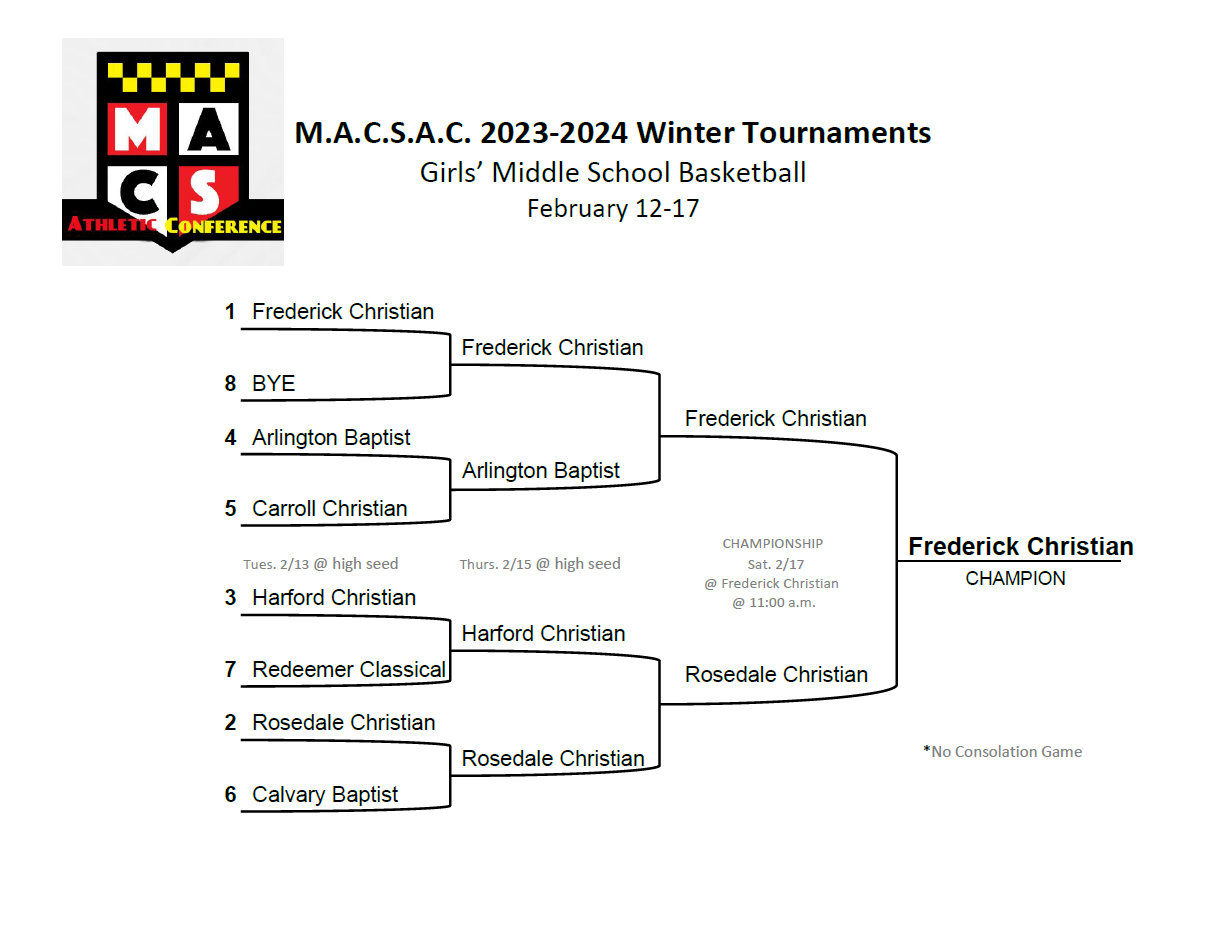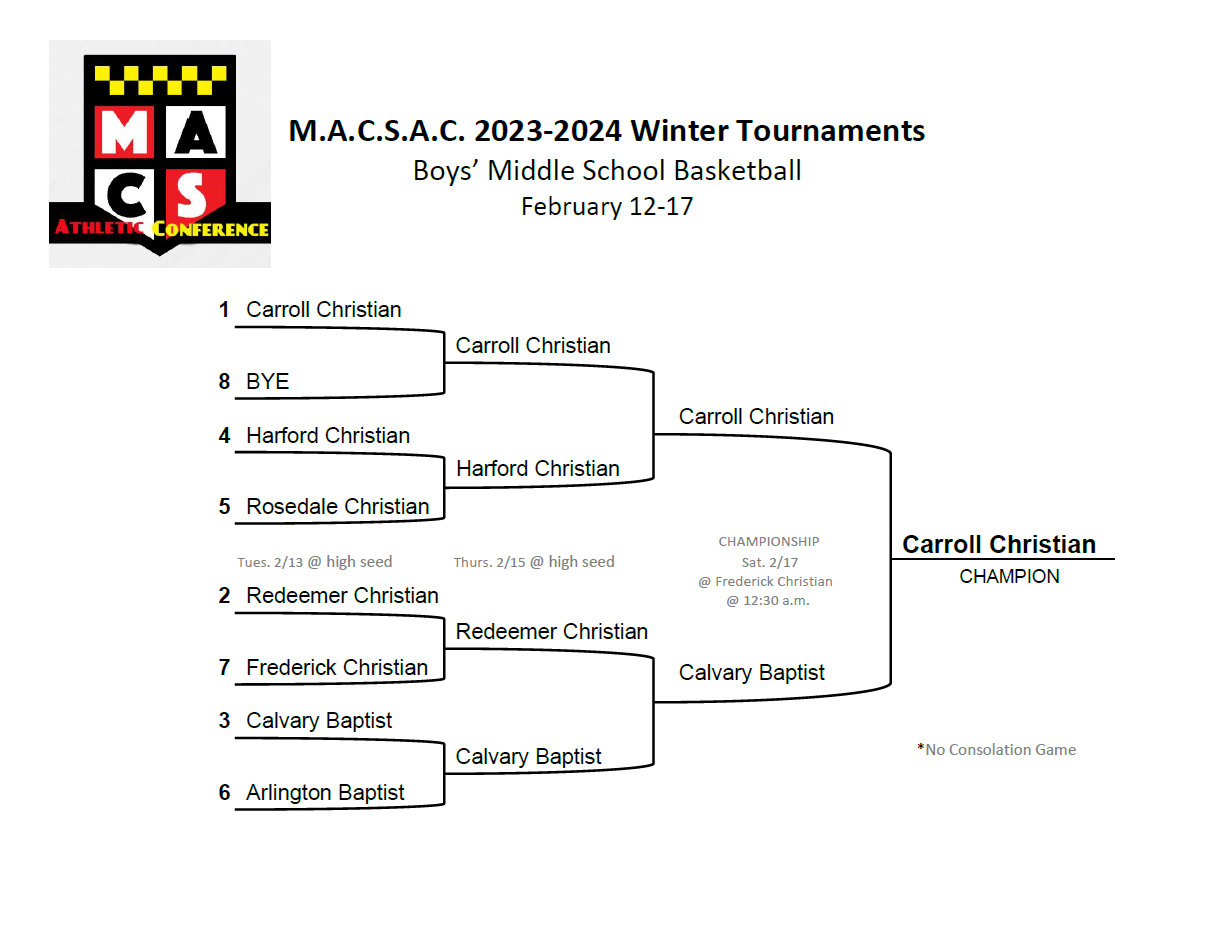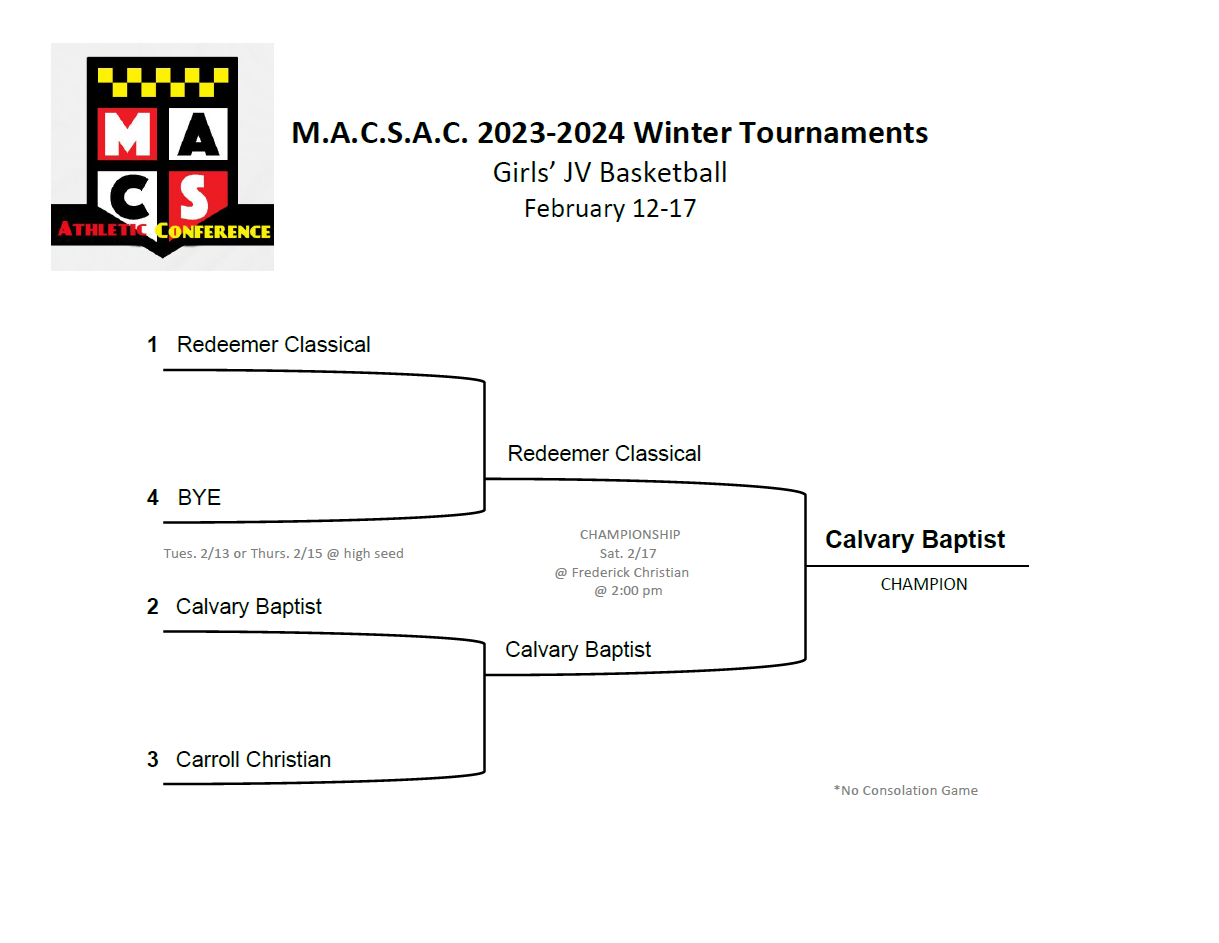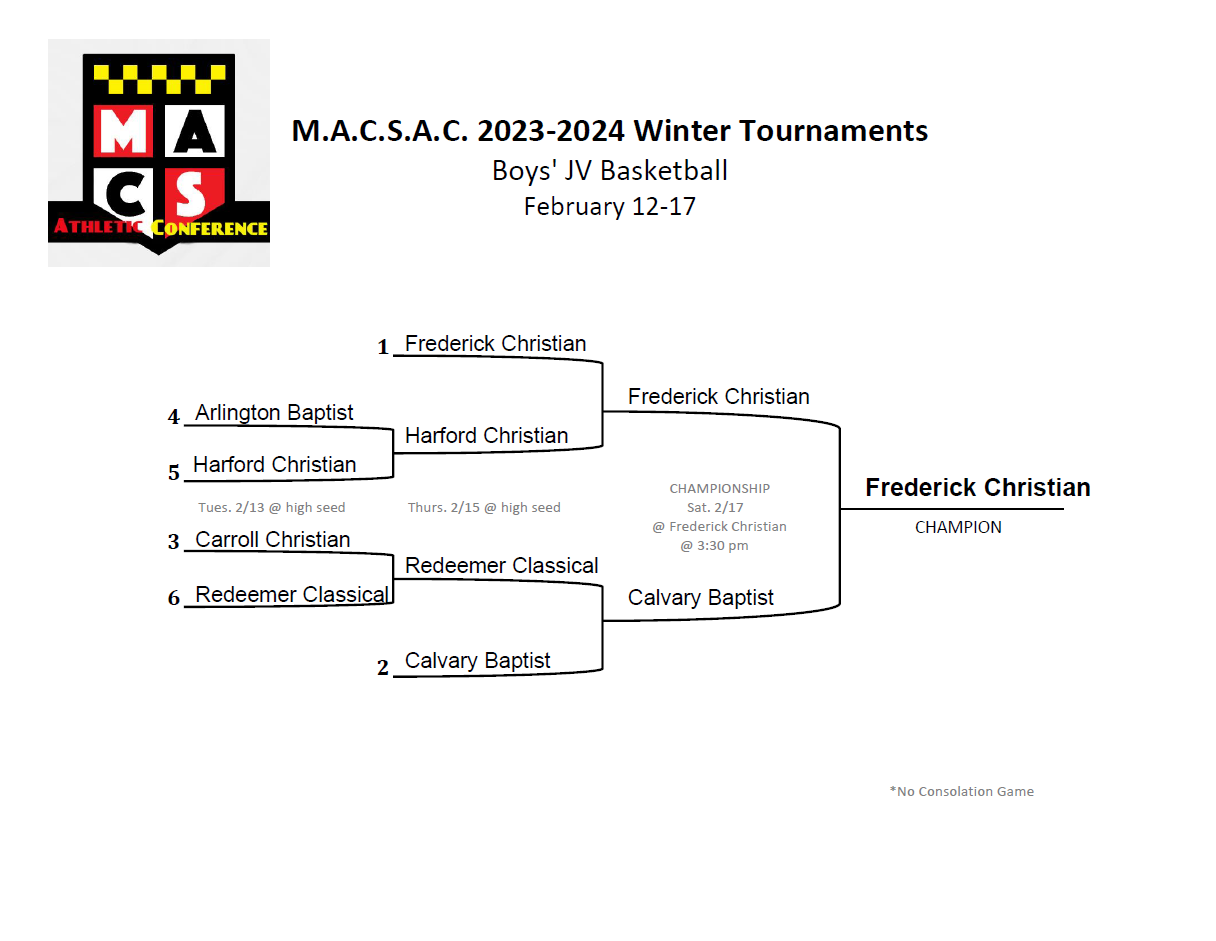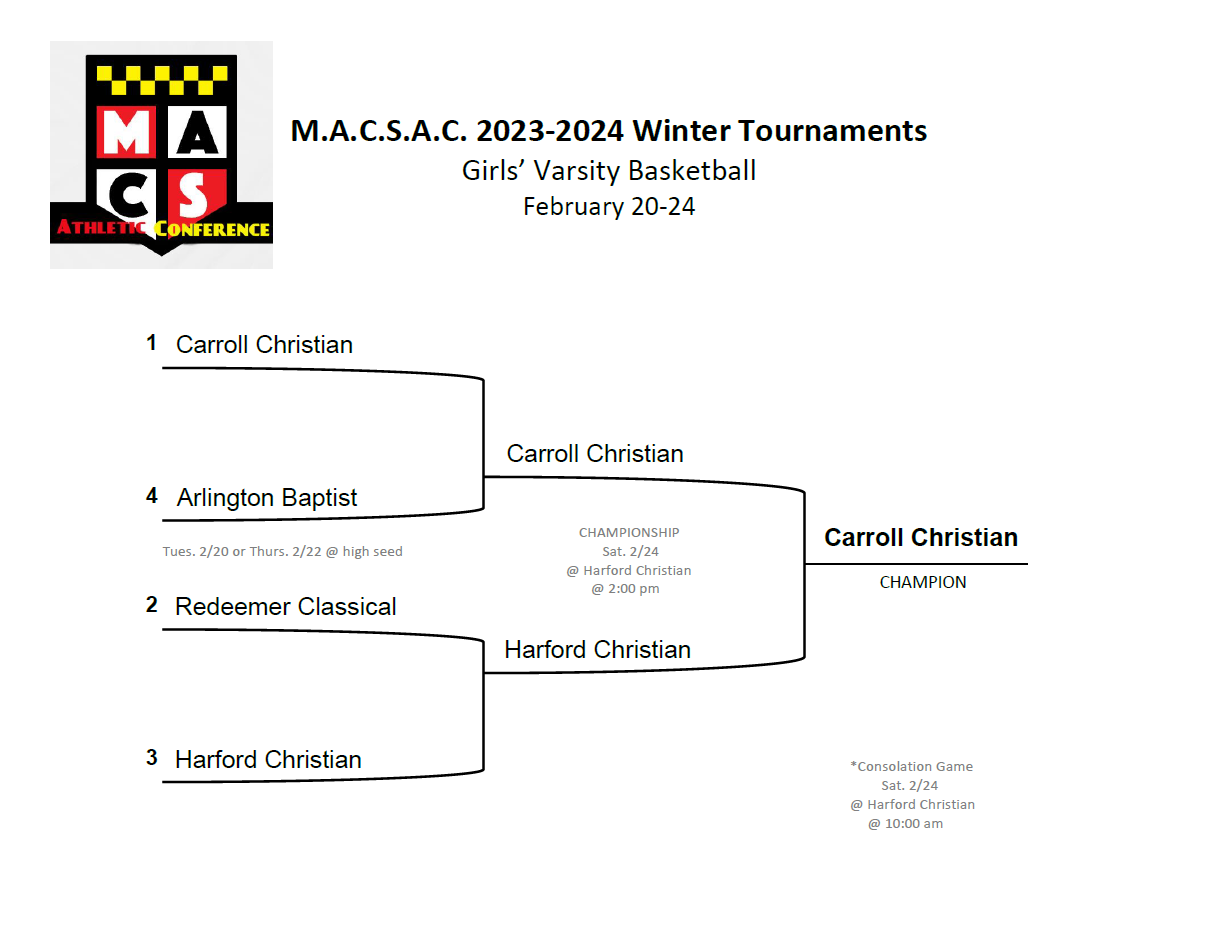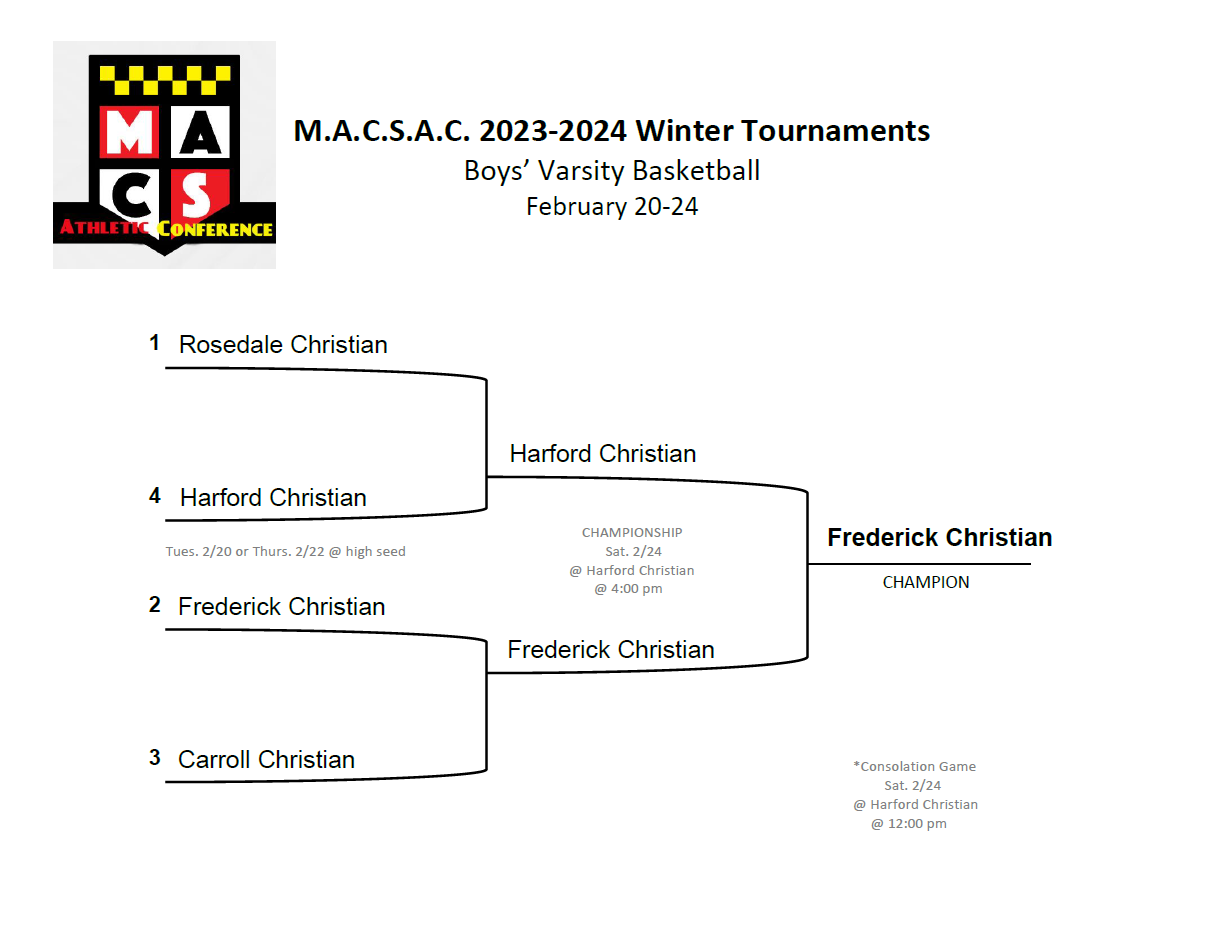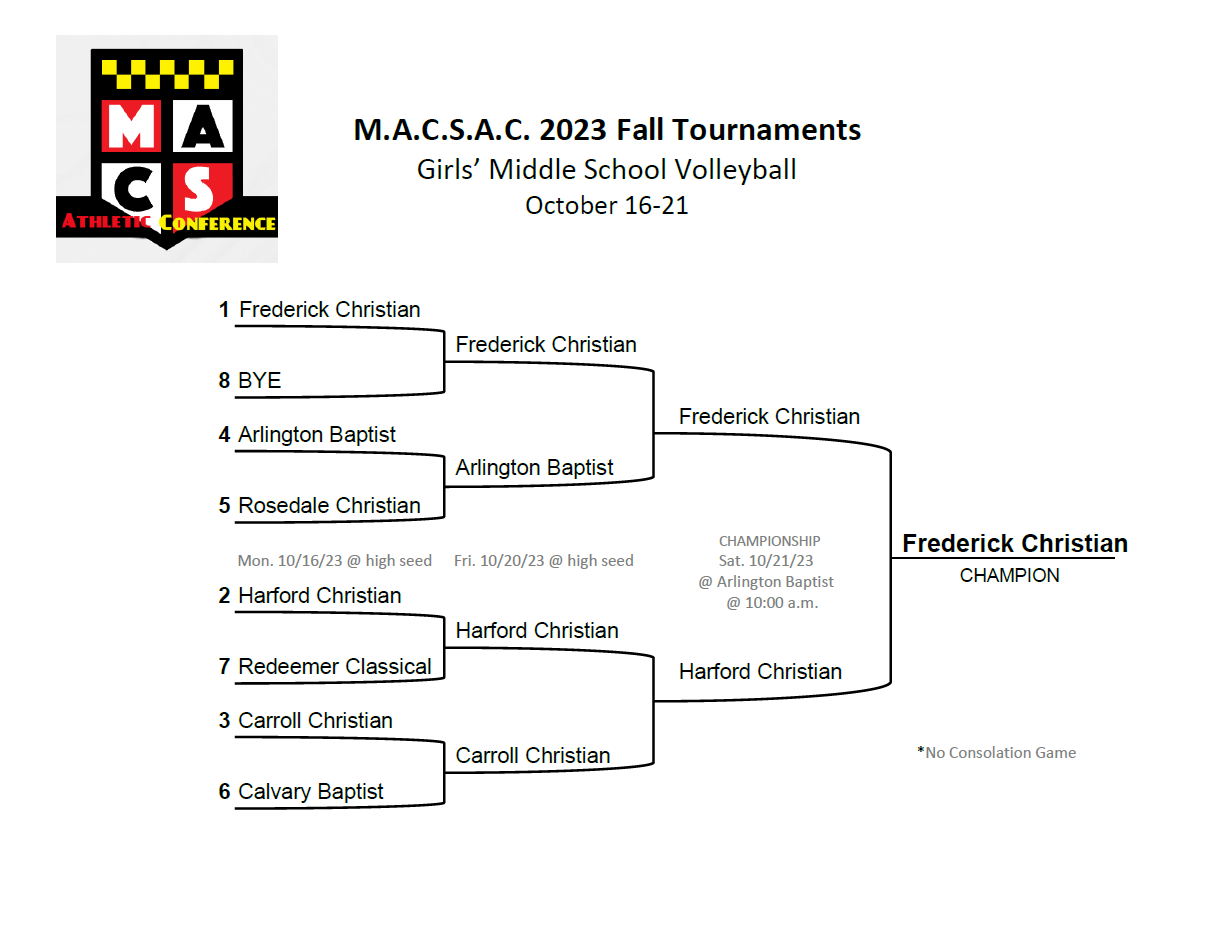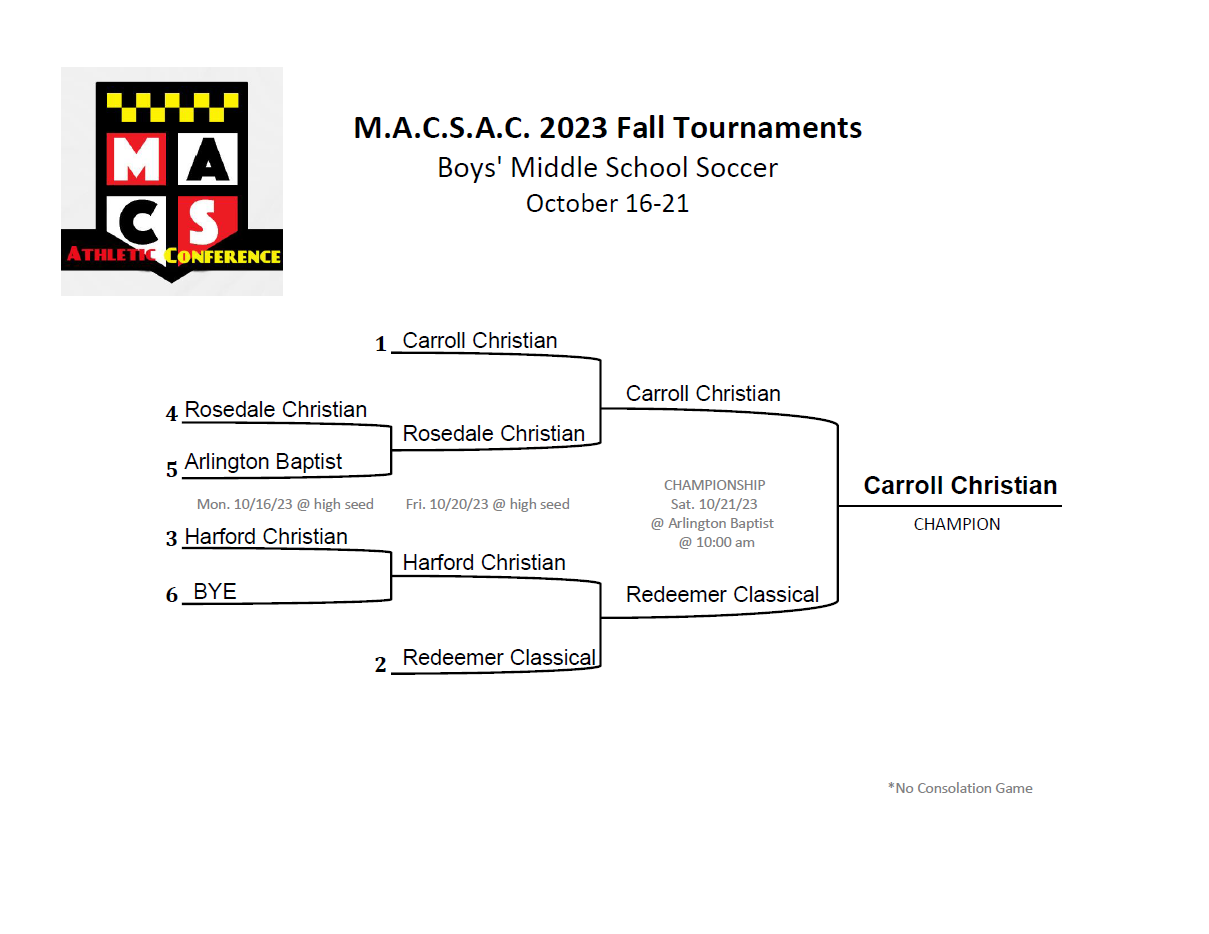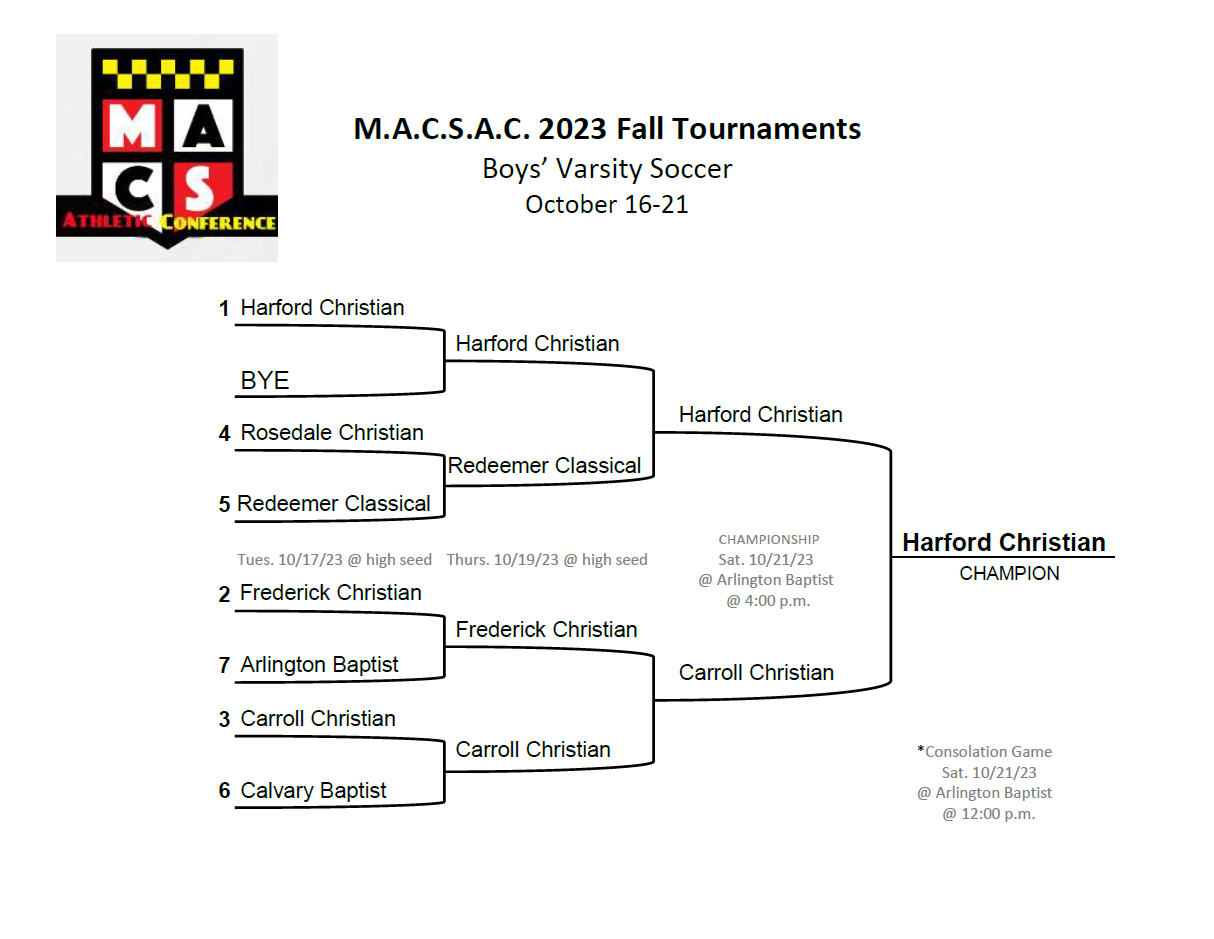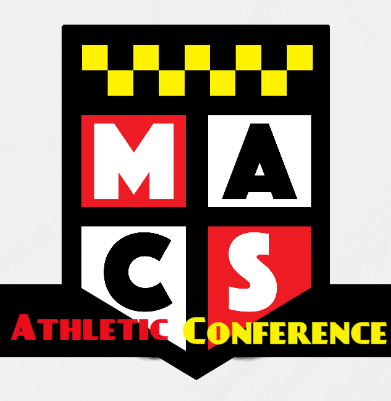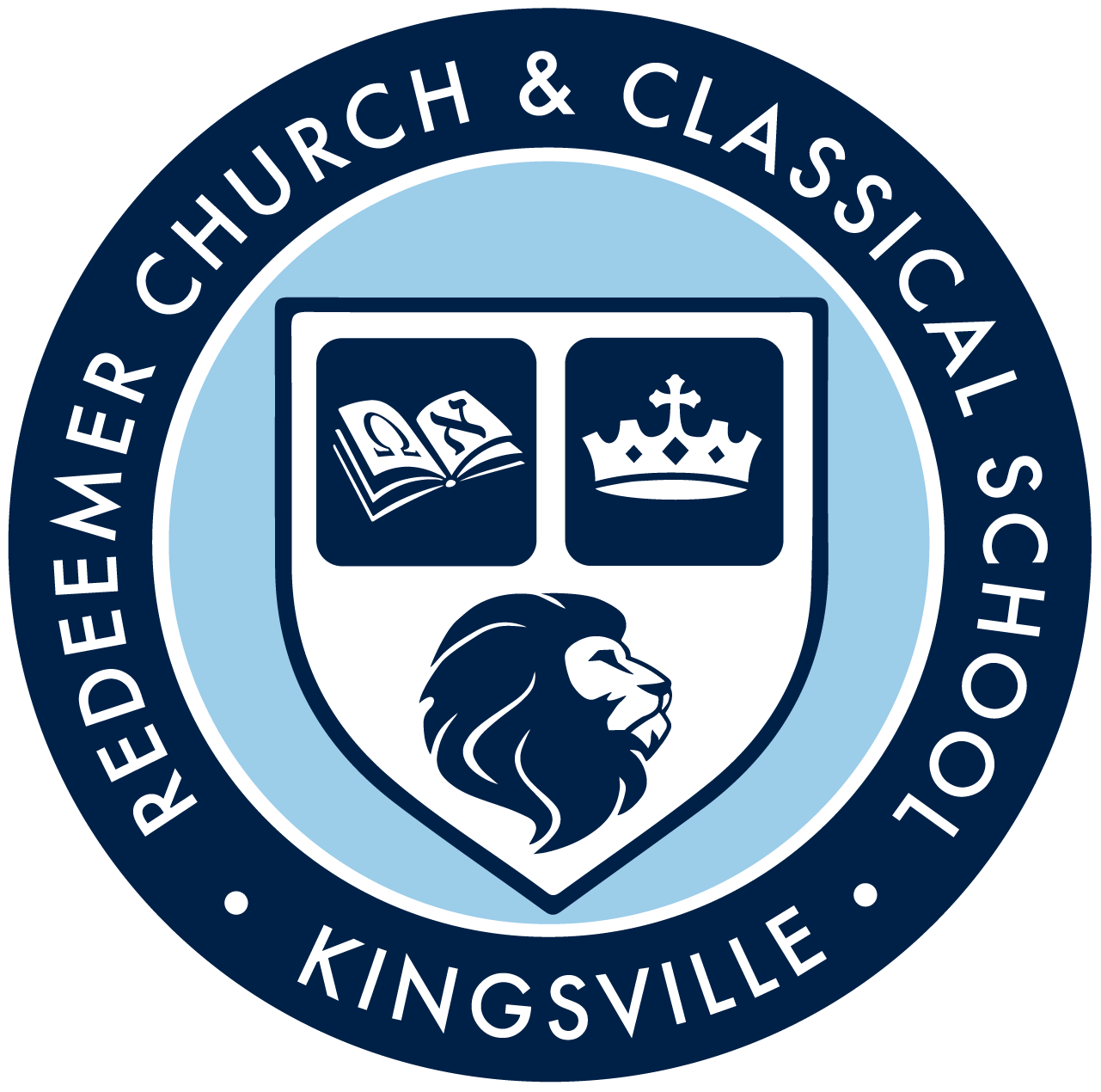MaCS Athletic Conference
"And if a man also strive for masteries, yet is he not crowned, except he strive lawfully." (II Timothy 2:5)
Director
David Lavoie - dlavoie@fcamd.org
MACSAC MEMBERs and Affiliate members
Handbook and appendices
Appendix E Yellow Card, Red Card, Technical, or Player Ejection Report Form
Appendix F School Report on Efforts to Enhance Sportsmanship Form
Appendix H Contract for New School Participation in MACSAC Tournaments Form
MACSAC Members’ and affiliate members’ Information
Arlington Baptist School
3030 N. Rolling Road, Baltimore, MD 21244
410-655-9300
www.arlingtonbaptistschool.org
Administrator: Mr. Johnnie Whitehead
Athletic Director: Mr. Dakota Tharp
Email: dtharp@arlingtonbaptist.org
Calvary Baptist Church Academy
407 Marley Station Road, Glen Burnie, MD 21060
410-768-5324
www.cbcaknights.org
Administrator: George Kirychuk
Athletic Director: Mr. Greg Miller
Email: adcalvaryknights@gmail.com
Carroll Christian School
550 Baltimore Boulevard, Westminster, MD 21157
410-876-3838
www.carrollchristian.com
Administrator: Mr. Todd Comstock
Athletic Director: Mr. Gavin Jennings
Email: gjennings@carrollchristian.com
Frederick Christian Academy
6642 Carpenter Road, Frederick, MD 21701
301-473-8990
www.fcamd.org
Administrator: Mr. David Lavoie (MACSAC DIrector)
Email: dlavoie@fcamd.org
Athletic Director: Mr. Tyson Foshee
Email: tfoshee@fcamd.org
Harford Christian School
1736 Whiteford Rd, Darlington, MD 21034
410-457-5103
www.harfordchristian.org
Administrator: Mr. Bryan Wilson (MACS Executive Director)
Athletic Director: Mr. Kyle Campanella
Email: kcampanella@harfordchristian.org
Asst. AD: Mrs. Ann-Marie May
Email: amay2@harfordchristian.org
Redeemer Classical Christian School
6415 Mt. Vista Rd. Kingsville, MD 21807
410-592.9625
www.rccs.org
Administrator: Glenn Fisher
Athletic Director: Joel McCracken
Email: joelmccracken@rccs.org
Rosedale Christian Academy
9202 Philadelphia Rd., Rosedale, MD 21237
410 687-6844
www.rbspanthers.org
Administrator: Stan Stone
Interim Athletic Director: Ms. Angela Cuocci
Email: acuocci@rosedalechristian.org
Philosophy of Athletics
The inspired writers of Scripture leave no doubt that athletics were a part of the context in which they lived. References to sport, physical training, and competition suggest that they are not off-limits to followers of Christ. References to boxing, training, wrestling, and running a race confirm that athletics are legitimate in a Christian’s life. Paul acknowledged in I Timothy 4:8 that there is, indeed, profit from bodily exercise. He then reminds believers that bodily exercise, like other areas of life, pales in comparison to godliness. The believer’s body is the temple of the Holy Ghost, and bodily exercise, properly undertaken, IS an exercise in godliness. Physical conditioning for God’s glory, for health and development as “good soldiers of Jesus Christ,” and not for sensuality or show, is a spiritual exercise.
As the Christian school movement developed in the 20th century, athletic programs became part of most school programs. Those entrusted with the oversight of Christian school athletics have great influence on a highly visible aspect of the ministry. This includes the Christian school administrator, athletic director, and coaching staff. When a school offers intramural or interscholastic athletics participation to its students, it embraces a process that may serve to be a great blessing and useful tool of instruction. Often overlooked and/or neglected, however, are the perils that are ever-present in the realm of athletics. Following are a few of those perils:
“And if a man also strive for masteries, yet is he not crowned, except he strive lawfully.” (II Timothy 2:5)
We reside in a sports-dominated society. Consider how much our conversation, television viewing, radio listening, and reading are related to sports. October focuses attention upon the World Series. From September through February, professional football dominates Sunday afternoons and Monday nights. Have you heard the expression “March Madness,” a time when collegiate basketball consumes most of America’s attention? Every two years, the whole world watches as elite athletes from many nations compete in summer or winter Olympics. These examples only begin to reveal the influence of sports and athletics on our culture. Over-emphasis is a continual peril to be avoided.























